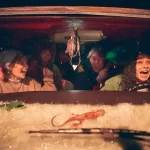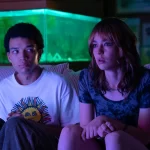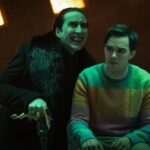European Union Film Festival, week 3, by Aaron Pinkston
Every March, for the past 15 years, the Gene Siskel Film Center in Chicago, Illinois brings a wide variety of new films from around Europe during the European Union Film Festival. This year’s festival has films from 26 countries and 61 Midwestern premiers. Each week of the festival, I will bring a few select reviews from the schedule’s diverse selections.

You Ain’t Seen Nothin’ Yet! (Alain Resnais, France)
You Ain’t Seen Nothin’ Yet! has been publicized as French film master Alain Resnais’ last film, and it’s a pretty good swan song [Editor’s note – despite a publicity campaign geared towards this, Resnais is actually in pre-production for another film]. With the theory of “burn out or fade away,” not many film directors, especially ones with as much longevity and importance as Resnais, are able to go out on such a high note. You Ain’t Seen Nothin’ Yet! is a nice tribute to its maker and creators everywhere. It’s also just a lot of fun to watch.
The film opens with a number of people getting a phone call with very bad news, that one of their friends has passed away. For those who are attentive lovers of French cinema, you would notice that each person is addressed by the actors’ real names — it is a bit perplexing at first, but makes sense once the film really kicks in. These actors are invited to a service and funeral of their beloved friend, to take place at his estate, a gigantic house wedged on the side of a mountain. At this point, the film feels like a strange re-telling of The House on Haunted Hill, which isn’t so far off. We learn that the recently deceased was a playwright who worked with all of his guests during various productions of his play Eurydice. On this occasion, they will all watch a filmed production of the play, hopefully inspiring them to reminisce on their experiences with their lost friend and reconnect with each other. Something strange happens in the play’s first few moments, though, as one of the guests begins reciting a remembered line at the same time as the recorded actor. On cue, the guests begin their own performance in a dazzling, mind-boggling and beautiful demonstration of acting, directing and editing.
Through the editing style, we often see three different performances from the different casts of the same scenes, which becomes very fun to watch as an exploration of acting. The performers don’t necessarily play differently, but you start to see the tics of the actors in their personal portrayals. The film is also tremendously crafted by Resnais. He’s constantly adding complexities, layering the performances together, including multiple performances in the same frame, and interestingly mixing the interactions between the casts. More importantly, he knows just when to step back to let the actors play a scene without interruption. In the role of puppet master, he often changes the rules of the game, and each time he does, it flickers something in your brain.
Any themes you extract from the film are probably on the subtextual level. I imagine this is at least partly by design — Eurydice seems to be an intentionally broad, universal type tragic love story. It is even noted to be inspired by a story from Greek mythology, so that is fairly unavoidable. The play is interesting enough to keep you engaged, but really is the vessel for the actors’ portrayals and Resnais’ creative direction. In the play’s third and fourth acts, it takes on a life of its own, becoming more complex in its narrative, which allows Resnais to tone down his presentation. Still, so much can be extrapolated from the actors — though it can certainly be argued that this film is style over substance, there is a lot of weight to the actions. There is so much history felt in the cast and how they interact with each other during their performances. You can really feel the months or years of work they would have spent together in the making of a theatrical production.
I think You Ain’t Seen Nothin’ Yet! will strike something in anyone who has acted or been apart of a theatrical production on any level — it certainly brought emotions back in me from history in high school and college theater. The film really nails the camaraderie of the group, the love and respect you gain for each other through working together in such an emotional and pressured setting. Nostalgia often gets a bad rap, but You Ain’t Seen Nothin’ Yet! argues for the power and importance of being nostalgic. A theater (or film) group is a community unlike any other I’ve had in my life, and this film is clearly Alain Resnais’ love letter to all the actors he has worked with in his career.

Chasing Rainbows (Dan Chisu, Romania)
Over the past decade, Romania has risen to one of the premiere film producing countries in the world. Somehow, I’ve never seen a Romanian film, but given other Eastern European films I’ve seen and the reputation of films like 4 Months, 3 Weeks and 2 Days, I had a certain expectation of their tone. Seeing that one of the Romanian films being played at this year’s European Union Film Festival was a comedy, I was perhaps more interested to try it out without the fear of being bludgeoned. Though Chasing Rainbows isn’t exceptionally humorous, it showed itself to be unexpectedly smart in its construction and a complete surprise by the end.
Chasing Rainbows focuses on two unrelated stories of people coming just within the grasp of riches. The first story is of an older man who has been recently fired from his job when the company decides to incorporate more technology into the workplace — when they find that he is completely computer illiterate, he becomes expendable. In order to get back into the field, he takes a computer class and slowly becomes integrated. Though this plot may not seem particularly new or interesting, there is something about seeing a complete rube walk through an instruction manual while completely misunderstanding the most basic computer knowledge (Why would you click on start when you need to shut down? Shouldn’t you click on end?).
The second narrative sees an unemployed 23-year-old who enters into some sort of lottery just to talk with the girl who is administering the survey. When she contacts him the next day to tell him that he won, she hopes that he will split the one million Euro prize. The problem is, he put down a fake name and so they need to hatch a plan to collect the winnings. Despite its rather madcap setup, the second narrative doesn’t seem to be playing much for comedy — though perhaps there is some cultural humor that I couldn’t pick up on, or comedy being lost in translation. This section certainly isn’t dramatic, but it doesn’t seem to be going for the easy jokes of the computer scenes. Honestly, I found a lot of this plotline to be a bit dull, with characters I didn’t particularly like and couldn’t connect with.
Chasing Rainbows does something rather extraordinary with its narrative construction, however. Building toward the climaxes of the two stories, through very subtle changes in tone, they come to a match, but with very different effects. In the less comedic story, we have our two characters travelling to the Romanian countryside to find a particular person with the fake name in hopes of buying him off. There is a certain expectation going into this scene with the protagonists perhaps a bit too hopeful of their scheme, and an indication that they might be a bit out of their element. When they are invited in to meet their mark, things take a turn to the deathly serious — and in that way, it becomes more comically toned than anything up to that point. On the other hand, our budding computer expert comes across a spam e-mail, an event with the very same comedic beats of his previous misadventures, but our knowledge gives us a sinking feeling of what might happen. The way that these two storylines fold tonally is pretty remarkable to see, and despite their apparent non-relation, they really start feeling of the same piece. After these respective moments, the stories build together and off of each other, toward a specific moment that I won’t spoil here.
It should also be noted that Chasing Rainbows is a really well made film. Though it seems to be pretty modestly budgeted and aimed, it doesn’t look cheap at all. The camerawork and Dan Chisu’s direction are often dynamic. The film also has this wonderful glow, I assume done through lighting and editing techniques, that gives it an incredible look. It’s not often that a small comedy has this much detail in the filmmaking, which is enough of a draw to get you through the sections of the film before it gels.

Wasteland (Rowan Athale, United Kingdom)
If there is one thing that the European Union Film Festival doesn’t showcase well it is genre filmmaking. You’ll get your comedies and ultra-serious dramas, but less mainstream filmmaking is harder to find on the schedule (doesn’t Europe make horror films these days?). With that in mind, I was excited to see Rowan Athale’s Wasteland, a gritty heist film from England.
The United Kingdom has recently built a strong tradition of vibrant crime thrillers, and Wasteland is nearly there, but can’t quite live up to the films it was likely inspired by. Told through the framework of a police interrogation, Harvey (Luke Treadaway) recounts an attempted robbery-gone-wrong of the local drug kingpin who had previously framed him. In order to take the job on, Harvey enlists his three friends, who don’t have much experience in the criminal life, but are willing to help. Wasteland’s setup is ripe with possibilities — seeing the criminal world through the young cast, it has the potential of being Snatch for a new generation. Sadly, though, with an inconsistent tone and confusing plot, Wasteland feels like it puts on a suit and tries to act like a grown up.
Perhaps the biggest contributing factor is the film’s tone. While it isn’t completely humorless, it definitely feels too serious, especially with its main character. It’s not for the inability of Luke Treadaway, who was brilliantly funny as the pothead tagalong in Attack the Block, but the film seems to dress him up as a brooding tough guy, which doesn’t quite fit him. Strangely, there are many moments in the film where characters say that they aren’t threatened by Harvey, so perhaps this character is deliberately crafted, but I didn’t buy it. Throughout the film, I kept hoping that the character would just loosen up a bit, thinking that may have a similar effect on the whole film, but it just doesn’t happen.
Worse yet, he is surrounded by supporting characters who don’t seem to be in the same film on an emotional level. In one particular scene, Harvey visits one of the quartet in the hospital after he has been viciously beaten. Taking responsibility, he is at perhaps his most somber state in the entire film. Charlie, though, can’t help but joke about being doped up on morphine. The two characters share the same space and are engaging in a conversation, but feel like they are in different films. Iwan Rheon plays Harvey’s best friend, a wise-cracking smart ass and Matthew Lewis (yes, Neville Longbottom) is a dimwitted bruiser (yes, Neville Longbottom is kind of a badass) — if Harvey had any of the charisma of his supporting friends, Wasteland would have been much more enjoyable. I even imagine Rheon and Treadaway flipping roles and seeing a better output here. In his one dramatic scene, Rheon shows the intensity that Treadaway sorely lacked and he may have been better suited for the comedic relief, as well.
The elements of the heist prove to be much more complex and satisfyingly slick, thanks to a particular narrative device employed by the film. In the same way, the heist feels like a bit of an afterthought, with much of it coming after a fake ending and delivered in a way that is completely nonsensical. Still, once the film is in its final act, things start to come together a bit with the pace picking up and some stakes introduced. It’s sadly not enough to make this an enjoyable film.

Death of a Superhero (Ian Fitzgibbon, Ireland)
Like many teenaged outsiders, Donald turns to art to cope with life, endlessly sketching in his notebook. Because Donald’s drawings have a dark, macabre tone, his parents fear he may have thoughts of hurting himself — a natural impulse for people in their position. In Death of a Superhero, their worry is quite justified, as his dark thoughts are coupled by the fact that he has terminal cancer and doesn’t care for the radiation treatment he’s receiving.
It’s easy for teen cancer stories to quickly get melodramatic, but Death of a Superhero resists that urge — it doesn’t underplay its serious stakes, but never feels like it is laying it on too thickly. This is partly thanks to the many animated sequences of the film (Donald’s drawings come-to-life), which are able to shine a light on Donald’s psychological state without being overly dramatic. The superhero story also provides a nice balance with the serious circumstances while giving an alternate narrative that is interesting enough on its own. As the film goes on, we start seeing Donald interacting with the characters from his drawings, which is an interesting on-screen effect, but becomes a little more on-the-nose than the stand-alone animated sequences. Better yet, the film knows when to interject this device, allowing it to add to the narrative without getting in the way of the natural drama.
A lot of the credit must go to the film’s two stars, Thomas Brodie-Sangster and Andy Serkis. Brodie-Sangster has a difficult role in Donald, but he plays it naturally, hitting all the emotions and distance found in depressed teens. He also is an incredibly likable person, though, which is unexpected given his circumstances. He is able to balance the incredible pressures in his life with moments of liveliness — screenwriter Anthony McCarten (adapting his own novel) deserves props for this, as well. As Donald’s thanatologist, Serkis is on the top of his game, as usual. There’s no doubt why he always gets cast in the motion capture roles that made him famous, but it is always nice to see his face. Donald and Dr. King’s sessions allow them to talk about life, art and love. They aren’t exactly groundbreaking conversations, but they are smartly written, continually giving us insight into the characters’ lives and thoughts. The chemistry between the actors helps build their relationship, which works nicely.
Near the end of the film, when most hope is lost for Donald, the film’s narrative shifts to his brother and friends on a mission to make sure he doesn’t die a virgin. While it doesn’t quite stoop to the levels of a teen sex comedy, keeping its general mood, the plot turn is a bit underwhelming. I can see where this subplot could be more fulfilling in the source material, which would have the ability of gradually exploring the ideas of youth and masculinity, but the film doesn’t have the time to get much past the surface.
Death of a Superhero is a devastatingly realistic look at how illness affects everyone involved. Buoyed by a superb cast, especially its young star, the film is refreshingly honest in its tones and emotions, never feeling unnecessarily cloying. A major romantic subplot that is sweet, but fairly unoriginal, and a few attempts at broad humor don’t wholly work, but don’t detract enough from what is otherwise a nicely raw and beautiful story.



























